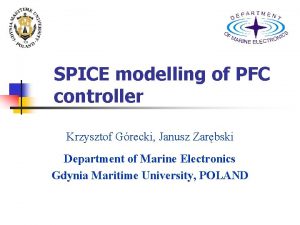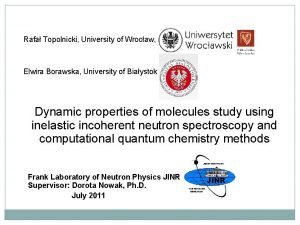Adam Sulikowski University of Wrocaw Departament of Legal















- Slides: 15

Adam Sulikowski University of Wrocław Departament of Legal Theory and Philosophy of Law Centre for Critical Legal Studies

Main theses * The revolution in Poland is a reaction to the current set of political ideas that were presented to the public as fundamental European values. * These values were the result of a compromise made by the elites in the last years of socialist rule. * The Polish version of "European values" is definitely more neo-liberal in economic matters and more conservative in moral matters than western versions. * "European values" were never negotiated with lower social classes, but were imposed as non-alternative and only correct. * This is why the lower classes remain passive and do not object to violating the constitution and to limiting the independence of nomocratic institutions.

Post-Marxist approach to the issue of values 1. Rejection of "Platonic idealism. " "Values" exist only as social phenomena. „Values” are social beliefs about goods worth protecting, ways of life worth cultivating and goals worth achieving. 2. Being determines consciousness - Values are of a class character. Their genealogy can be explained by reference to material factors. 3. The rejection of the deterministic historiosophy of classical Marxism the history of values is contingent, although it is associated with economic and social changes. 4. Strong cognitive relativism. Objective truths and values do not exist. Every truth and every value has an ideological character. 5. Rejection of Cartesianism and the notion of the subject. The human being is a "multifrenic" product of discourses. 6. Rejection of the substantial concept of the class. The class is only an analytic concept. In different societies and in different circumstances, the concept of a class will refer to different states of affairs. 7. Limited economism. While economic factors are the most important in the process of explaining intellectual social phenomena, it is possible to change the base due to the change of the superstructure.

Values and Ideology * Thoughts of the ruling class are in every age dominant thoughts. This class, which is the dominant material force in society, is at the same time the creator and guardian of the prevailing values (K. Marx) * Ideologues deceive themselves when they think and say they do not cultivate ideology but follow the intellectual spirit of the era (K. Marx) * Ideology covering all spheres of human activity is the only reality available. For this reason, the choice of the human individual can not be made between reality and illusion, but only between existing ideologies. Everyone should choose a set of values that represents his interests (L. Althusser) * In capitalism, the bourgeoisie holds power not only through its control over the means of production, but also through its domination over institutions of the superstructure. Cultural domination gives the ruling class means of indoctrination and control, it neutralises the status quo and persuades the other classes that the values of the bourgeoisie are natural and legitimate (A. Gramsci)

Hegemony and Values * Hegemony as a form of authority combines power and legitimacy, in turn authority that only consists of domination is never legitimate (A. Gramsci) * The conception of hegemony goes beyond political leadership of a class striving for state power and rather emphasize the construction and operation of intellectual and moral leadership (Ch. Mouffe) * The hegemonic apparatuses together form the ideological structure of a dominant class. The process of production and diffusion of ideology takes place on the level of the superstructure which is called civil society (E. Laclau) * Hegemony resembles a scientific paradigm. It is a set of rules and values defining what and how to speak. Despite the fact that theory of paradigms itself shows the casual nature of each of them, from the internal point of view the paradigm rules are perceived as the only right ones. (F. Rossi-Landi)

Critical attitude towards values – Priest and Jester *The priest is the guardian of the absolute; he sustains the cult of truths accepted by tradition as ultimate and unquestionable. The jester is the impertinent upstart who questions everything we accept as self-evident. If he belonged to good society, he could at best be merely a purveyor of dinner -party scandal. In order to point out the unobviousness of its obviousnesses and the nonultimacy of its ultimacies, he must be outside it, observing it from a distance; but if he is to be impertinent to it, and find out what it holds sacred, he must also frequent it. (L. Kołakowski)

The Priest * • The Polish Constitutional Tribunal (TK) started to work on 1 st January 1986 * „What is at stake is the creation of an institution (…) serving the protection of the famous middle class (…) from the possible appearance, within parliament, of a majority which could bring the capitalist reform to a halt or would be able to reverse its direction. What is at stake, is an institution of a politico-juridical police which will act as a guardian of the construction of capitalism. ” (Jerzy Ładosz, marxist professor and member of „conservative” faction in PZPR, 1987) * • The amendment of the Polish Constitution in 1989, introduced the new competences of the Constitutional Court - the task to provide universally binding interpretation of the laws and a priori control of legal acts. * • The TK become one of the most activist court in Europe * • The activism of judges was under strong protection of the professional constitutional discourse * • Western neo-liberal standards presented as European Values had been recognized by the official legal discourse as normal, universal and the only correct

The Religion * The Constitutional Tribunal bases its rulings on the acquis constitutionnel - a set of values that are widely accepted in Europe. In Poland, despite some controversies, these values and judgements based on them are an expression of compromise acceptable to all responsible and rational members of society. (Marek Safjan, Chairman of the TK, 2006) * If the rule of law of one of the Member States breaks down, the entire system will collapse - the guarantees of the rights of all citizens of the Union will be destroyed. That is why the basic values of the European Union are not negotiable (Marek Safjan, Judge at the Court of Justice of the European Union, 2019) * Foundations of the Religion: - Liberal nomocratism - Capitalism in the neoliberal version - Conservatism in moral issues

Hegemony • Undoubtedly, personal freedom and free market economy are the most important values of Europe and the entire Western civilization. (prof. L. Balcerowicz, economist) • The rule of law and well-functioning institutions are a source of pride in our society (prof. A. Rzepliński, lawyer, former chairman of the CT) • The constitutional model adopted in the Constitution can be described as a consensual democracy. In the jurisprudence of the Constitutional Tribunal, we find a balance between freedom and democracy, which is the basis of consensual democracy (R. Piotrowski, constitutionalist)

Hegemony * The representatives of legal science became obviously beneficiaries of the transformation both in terms of economic and political capital, staffing professional judicial and control bodies, gaining a real influence upon the activity of the state, at the same time ceasing to need to seek political legitimacy for the exercise of their juridical power. The decisions of supreme courts, including constitutional courts or other professional control bodies were presented as objective decisions, dictated only by the a priori existing legal rules or by the necessity of reason. They were commented in the same way by professional legal discourses. The alliance between the court and the university became durable and stable. The underlining of objectivity, autonomy and apolitical character of legal practice became an indicator of belonging to the mainstream of jurisprudence, it guaranteed the status of serious legal scientist who is capable of keeping clear of any political critique. (W. Sadurski)

Consensus? Some results of sociological research by Andrzej Kojder (2005): (E: elites, MC: middle class, LC: lower class) Question: Does the rule of law function properly in Poland? Answers: E: 86% Yes, MC: 62% Yes, LC: only 28% Yes Question: Is Polish law fair? Answers E: 88% Yes, MC: 57% Yes, LC: only 24% Yes Question: Are political rights and freedoms more important than adequate economic living standards? Answers E: 91% Yes, MC: 71% Yes, LC: only 33% Yes

Consensus? Elżbieta Skotnicka-Illasiewicz (2016) Elites: Acceptance of the pursuit of profit, priority of respect for entrepreneurship and approval of the benefits of free competition Lower classes: Expectation of state care, patriarchal family values, including lack of explicit approval for the work of women with children, acceptance of the Church's presence in public life, acceptance of the death penalty and lack of approval for homosexuality.

Panic *Poland’s Populism Threatens Europe’s Values, and Cohesion (New York Times) https: //www. nytimes. com/2018/02/20/world/europe/pol and-european-union. html *Authoritarian trends in Hungary and Poland threaten the EU more than Brexit does because they undermine the union’s legal foundations. Other EU governments need to defend the rule of law more actively. https: //carnegieeurope. eu/2017/09/04/defending-euvalues-in-poland-hungary-pub-72988 *Poland: What went wrong? - Of course, every country has its hooligans. What makes Poland different is that the hooligans are a key element of the government’s political base. https: //www. ecfr. eu/article/commentary_poland_what_w ent_wrong

Restoring „Order” • Understanding the causes of the crisis - both structural (contradiction in liberal democracy) and practical (so-called European values were not significant for the majority of society due to the ideological "heeling" of nomocratic institutions). • Promoting independent education among officials and among the lower social classes. Building fairer relations between nomocratic institutions and broad sections of society. • Accepting thesis that the current revolution is not an expression of the stupidity of the lower classes (J. Zajadło, M. Matczak), but is the result of a real but ignored conflict of interests. Kaczyński raised the power that lay on the street. • Kaczyński won because he could be a jester. Now, however, he is forced to replace the priest. This creates a chance for the next jesters.

Thank you for your attention
 Departament wychowania i promocji obronności
Departament wychowania i promocji obronności Jacek paziewski arimr
Jacek paziewski arimr Edward raban
Edward raban Departament innowacji i rozwoju
Departament innowacji i rozwoju Grecki departament
Grecki departament Departament
Departament Departament rozwoju inwestycji
Departament rozwoju inwestycji Departament prawny mon
Departament prawny mon Adam white facebook
Adam white facebook 沈榮麟
沈榮麟 Blake elohim creating adam
Blake elohim creating adam Wies hy gedig
Wies hy gedig Wie's hy adam small
Wie's hy adam small Definition of economics by adam smith
Definition of economics by adam smith Adam and eve hotel turkey
Adam and eve hotel turkey Que es la ventaja absoluta en comercio internacional
Que es la ventaja absoluta en comercio internacional





























